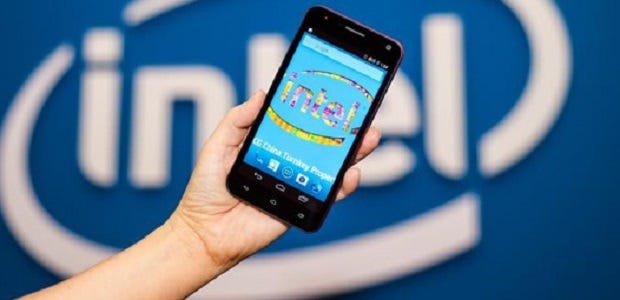Why Intel Quitting Smartphones Matters For PC Gaming
ARMdroid gaming, anyone?
And lo it came to pass on the 29th day of the fourth month (or thereabouts) in the year of some or other lord from antiquity 2016 that Intel did verily smite the Atom processor. Well, mostly. More specifically, what Intel has announced is effectively the end of its ambitions to get into smartphones. It has cancelled a number of future chips designed to achieve that end. You might very well wonder what this has to do with PC gaming. Immediately and directly, naff all. But in the longer term it could be critical and it involves the very meaning of PC gaming. Allow me to explain.
For the record, Intel has binned (and I'm not talking about selecting chips for superior speed) a couple of SoC or system-on-a-chip Atom-branded products that were destined to target the smartphone segment later this year, and also announced a change in company strategy. If you want codenames, Broxton and Willow Trail, for it is they.
Atom will live on for the time being as a chip for tablet PCs, but that's about it. The big new plan for Intel is to focus on cloud computing and smart/connected devices. Web servers and internet fridges that automatically order milk, then?
Whatever else the move means, the whole phones thing is dead. This announcement isn't a huge surprise. What is hard to understand is how Intel's efforts to succeed in the smartphone market have been so poor for so long. Intel's big competitive advantage has always been the process of chip manufacturing and that ought to have given it a real edge in mobile devices. But they blew it. Time and again.
 Microsoft's Hololens is allegedly Atom powered...
Microsoft's Hololens is allegedly Atom powered...
Of course, that observation doesn't account for the notion that trying to get into smartphones may have been a bad idea from the get go. The per-chip money to be made from smartphones is tiny compared to server processors - small enough for it to be a dubious use of Intel's cutting-edge chip factories even in the context of billions and billions of units.
Whatever the real reason, and you have to suspect that had Intel been more successful in the segment, they wouldn't be bailing out, the fact is that Intel's phone ambitions are toast and that raises the question of what, if anything, this means for PCs in general and, in turn, for PC gaming.
Arguably, much of the discussion here will be borderline philosophical and, at the very least, speculative. But Intel definitely not being in phones certainly will have an impact on the future trajectory of the PC, and if you game on a PC that will certainly matter. I can say that much definitively!
So, the first point is that the dream of the PC taking over as the default client computing solution for literally everything is dead. By PC I mean a computing device with hardware compatible with Intel's x86 instruction set for processors and probably running Windows, which in tautological terms is really what it means to be a PC.
It's never been quite clear how that would be achieved. But in rough terms one could imagine that if Intel did well in smartphones, those devices would eventually be powerful enough to replace desktops. In that scenario, the lump in your pocket might serve as both as a conventional smartphone type thing and also connect wirelessly to a big display on your desk or that future low-profile VR display.
Thus it would do all your personal computing. That vision may yet materialise, though technologies like cloud computing and thin clients that are little more than displays further cloud (ahem) that issue. But with this Intel news, if that future does come about, it won't be what we might think of as a PC that delivers the data. It now looks much more likely to be something with an ARM chip and running Android. Like most smartphones today, in other words.
Of course, if that's the default personal computing device, wither the PC as a general purpose personal computing device? Can the PC survive as a dedicated gaming platform? Can ARMdroid devices simply take over where the PC left off?
 ...but could the end of Intel's phone ambitions mean the future of gaming is ARMdroid?
...but could the end of Intel's phone ambitions mean the future of gaming is ARMdroid?
It's at this point that the discussion really turns philosophical. Exactly what is it that makes the PC such a great gaming platform? Is it stuff like the mouse and keyboard input paradigm? Is it the relative openness of the PC, its end-user configurability in terms of setup and software? Is it the physical flexibility and configurability? Or is it all of that and more?
Obviously, one can plug a keyboard and mouse into an Android device? But how does ARMdroid compare for openness, flexbility and configurability?
On a related note, is PC gaming already on a path towards being more an intellectual construct - an attitude to games design and playing games – than a pastime wedded to a particular platform? And if so, what does it matter if the device that gave its name dies?
All of this is going to take a long time to shakeout. It's almost certainly already happening. People are moving away from Windows PCs for casual computing and if nothing else that has to impact things like economies of scale for PC hardware which has long term implications for prices, product development and the broader diversity of the PC hardware ecosystem.
I have no idea what the end result of all this will be. If the PC as we know it does die, maybe the move to a new platform will reboot that intellectual construct of PC gaming very much for the better. In short, it could all be good or it could all be bad. But it will almost certainly be something important. And the end of Intel's smartphone ambitions is likewise almost certainly a significant milestone along the way to that something.
But that's what I think. What do you think?








